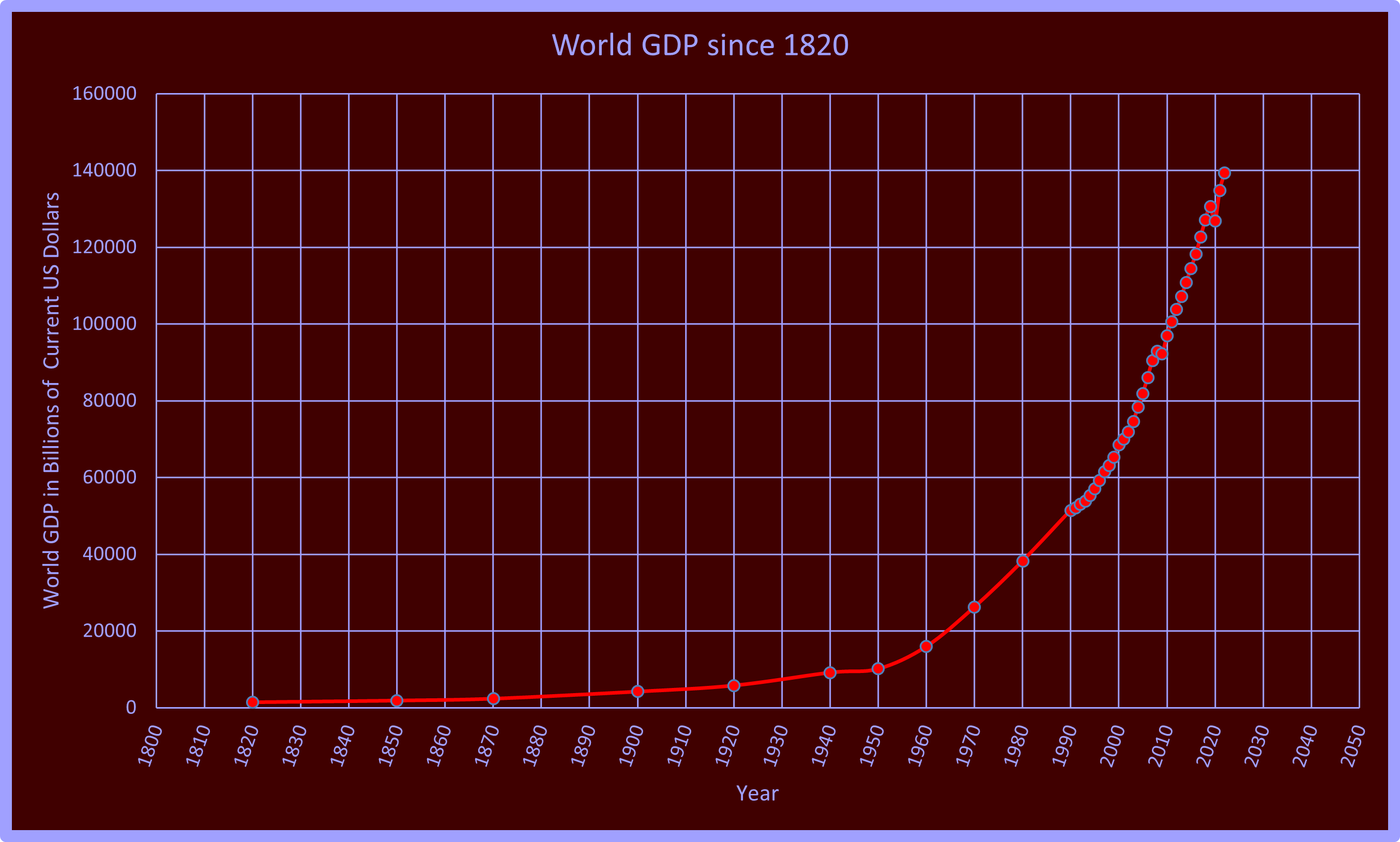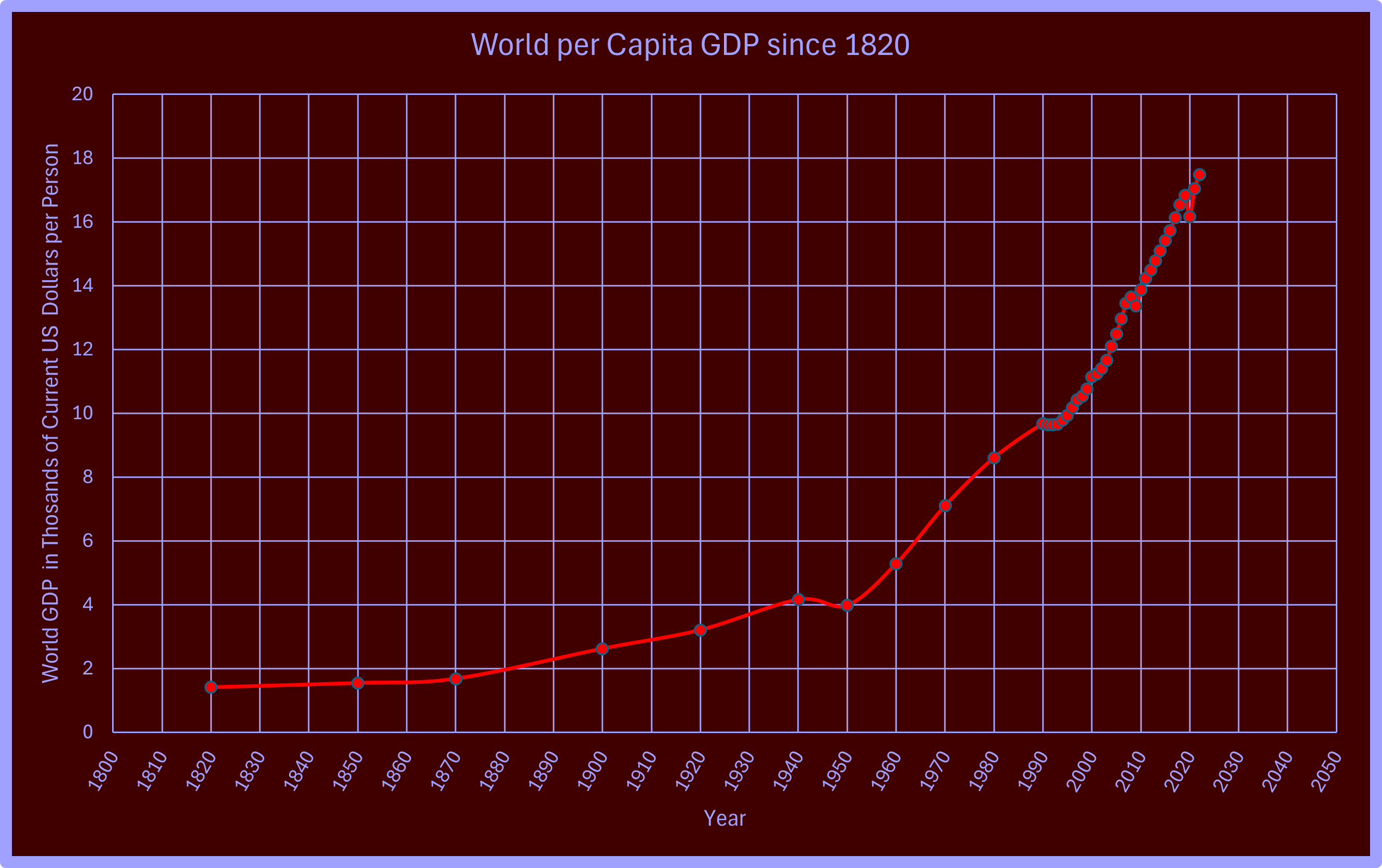

In a previous article, I discussed 'American Capitalism'. Since we celebrate Independence Day this week, some expansion on that theme is appropriate. We've explored this topic more than once in articles like 'More Pie Please', 'Achievement Economy', 'Does Amazon Deliver', and 'Then & Now Part 3'. Looking back, it is clear that in the broader sense, the Fourth of July is World Independence Day. It was a day that changed the world for the better. Yes, it's true; this fledgling nation was guilty of many of the same iniquities as the rest of the world at that time. We are all products of the times we live in, and America's founders are no exception. But they led the world to a new concept of freedom and created an economic engine that drove it to new levels of prosperity. The first graph below is a closer look at the graph from my previous article. It shows the world's gross domestic product, GDP, since 1820. The world GDP measures the total value of goods and services produced by the world economy in a year, measured in inflation-adjusted dollars. On July 4, 1776, the world's GDP was about one trillion dollars, about two-thirds of what the state of Florida currently produces and a bit less than the production of Los Angeles.

The transformation ushered in by the American Revolution was not merely about political freedom, but more significantly about economic freedom. The United States' unwavering commitment to free markets and a capitalist-driven economy set a precedent that the world had never seen before. In less than a century, the world's GDP skyrocketed to two and a half times its value a century earlier, a growth rate that outpaced the cumulative increase in the previous 300 years. Another century later, the world GDP had surged tenfold. This dedication to freedom and free markets sparked a wave of progress that endures to this day. As the US approaches its 250th birthday, the world GDP is a staggering 140 times larger than at America's founding. The second graph shows another way of measuring progress: GDP per person. This measure factors out population growth and demonstrates the benefits of the American Revolution on individuals. It indicates the average economic output and reward per person, which has significantly increased over the years. Everyone on Earth is now more than 13 times better off than when the US was born. The world's prosperity, propelled by the dynamic growth economy in the United States, continues today. This enrichment is the power of free-market capitalism. This system does far more than benefit the capitalists; it makes the world better for everyone.

Free-market capitalism has been a transformative force, lifting billions of people from poverty and improving the world. In 1820, a staggering 76% of the world's population lived in extreme poverty. Today, thanks to the transformative power of capitalism, less than 9% do. Those who oppose capitalism may not realize it, but they advocate a return to a fixed, no-growth economy, a system where economic progress is stagnant and everyone suffers. On the other hand, capitalism benefits everyone, making the world a better place for all. If everyone in the world understood the ramifications of the events of July 4, 1776, the world as a whole would be celebrating Independence Day because it was the beginning of a better life for everyone. The citizens of the United States have paid the price of this freedom. Americans have fought and died for freedom ever since its founding. My own fourth great-grandfather and two fourth-great uncles were killed in the Revolutionary War, as were several other relatives and relatives of my wife. My family has served in every war the US has fought since then. Most families in the US have a history of service in protecting freedom. This service, often at substantial personal cost, has also helped the whole world. Even those who still live in unfree countries governed by tyrants are better off now, thanks to the sacrifices of American families, who have endured the loss of loved ones and the hardships of war to defend the principles of freedom and democracy. As you gather with families and friends this holiday, it would be appropriate to pause from the festivities and reflect on the tremendous accomplishments of the American spirit since that day almost two and a half Centuries ago, the benefits the world received, and the price paid.
If you found this article stimulating, please share it with other folks who might enjoy it. And please share your thoughts below. Dr. Cardell would love to hear from you.

Responses